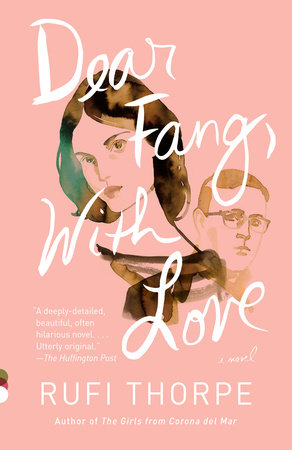Dear Fang, With Love Reader’s Guide
By Rufi Thorpe


1. Discuss the Milosz poem that prefaces the novel. How does the content of this poem relate to the themes explored in Dear Fang, With Love?
2. In the opening lines of Chapter 1, Vera writes to Fang, “At this moment, we are mental twins.” How did you interpret Vera’s relationship with Fang when you were first introduced to their correspondence? Why is Vera drawn to him? How did the inclusion of Fang’s letters in the latter portion of the narrative destabilize Vera’s narrative authority?
3. Describe Vilnius, as interpreted through the eyes of Lucas and Vera. How does the checkered history between ethnic groups affect the city’s cultural identity?
4. On page 10, Lucas admits, “I had never developed the set of paternal reflexes and instincts I assumed would assert themselves.” Over the course ofDear Fang, With Love, would you argue that these instincts do emerge? If so, when are they most apparent?
5. What are Lucas’s motivations for the trip to Vilnius? What does he seek to learn about himself? His heritage? How do Vera’s motivations for travel differ from her father’s?
6. Throughout Dear Fang, With Love, the reader becomes intimately acquainted with Lucas’s insecurities and anxieties. Discuss his discomfort with fatherhood. How does guilt factor into his relationship with his daughter? Would you say that he is “simple,” as Vera states in her letter to Fang?
7. How did the textual interplay between Lucas’s narration and Vera’s e-mails to Fang affect your reading experience? How did it help to elucidate or complicate the narrative?
8. The story of Grandma Sylvia and her “rape birthday” causes a great deal of tension and reflection throughout the course of Dear Fang, With Love. How does Lucas’s search for truth create anxiety throughout the narrative? How does his discovery that Herkus’s mother was indeed the child of Sylvia’s forest husband, rather than the SS officer, affect him? How does his relationship with Vera change after he reveals the true story of Sylvia’s escape to her?
9. Vera is clearly very intelligent, but, as the narrative often reminds us, she is still a teenager and, as such, prone to bouts of fanciful thought and immaturity. When does her age become most apparent in the narrative? How do Vera’s mental health issues make it difficult for her family to discern when she is being lucid but difficult versus when she is suffering from delusions and mania?
10. The concept of family, and the search for it, is an important aspect of Dear Fang, With Love. Consider Lucas’s past. How does he define family? How do his attitudes about family affect his relationship with Vera? How does the discovery of Herkus and his Lithuanian family undermine or influence his understanding of himself and his identity?
11. The ancillary characters in Dear Fang, With Love provide important context for Lucas and Vera’s trip to Vilinus. What role did Judith serve in the novel? How did Lucas’s fling with Susan affect his sense of self?
12. Throughout Dear Fang, With Love, Vera and Lucas describe Katya’s rejection of her American identity. Why do you think Katya is so hesitant to embrace her American side? How does Vera identify with her cultural heritage? Does her understanding of her cultural identity shift over the course of the novel?
13. Discuss the scene wherein Lucas and Vera argue about how Lucas is the “patriarch.” How is this interaction demonstrative of the power struggle inherent in their relationship? How does Vera’s reaction play into Lucas’s insecurities about fatherhood?
14. How did your understanding of Vera’s mental illness change over the course of the narrative? After she told her father that her breakdown at the party was the result of taking acid, did your perception of her change? Were you surprised by her eventual breakdown at the end of the novel?
15. Describe Vera’s relationship with her mother, particularly focusing on the Word doc created by her in Chapter 15. What does she admire most about her mother? What does she value about their relationship? How does Lucas interpret their mother-daughter relationship?
16. Discuss the final chapter of the book. How did you interpret Vera and Lucas’s conversation in the last scene? Would you say that their relationship is strengthened by their trip to Vilnius?
Just for joining you’ll get personalized recommendations on your dashboard daily and features only for members.
Find Out More Join Now Sign In